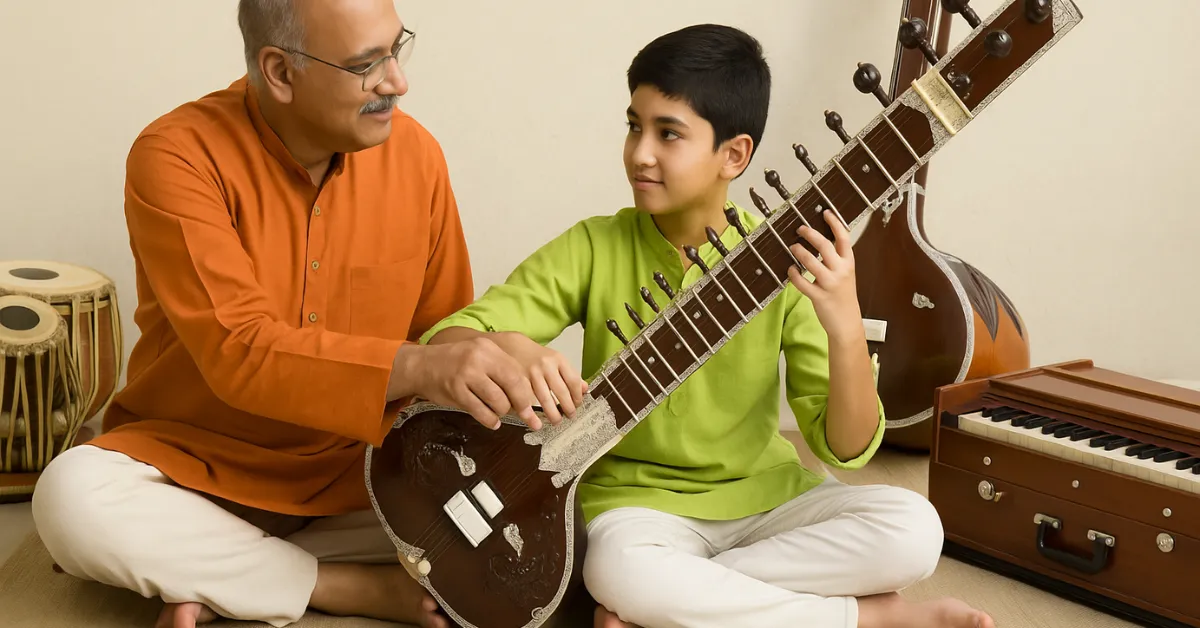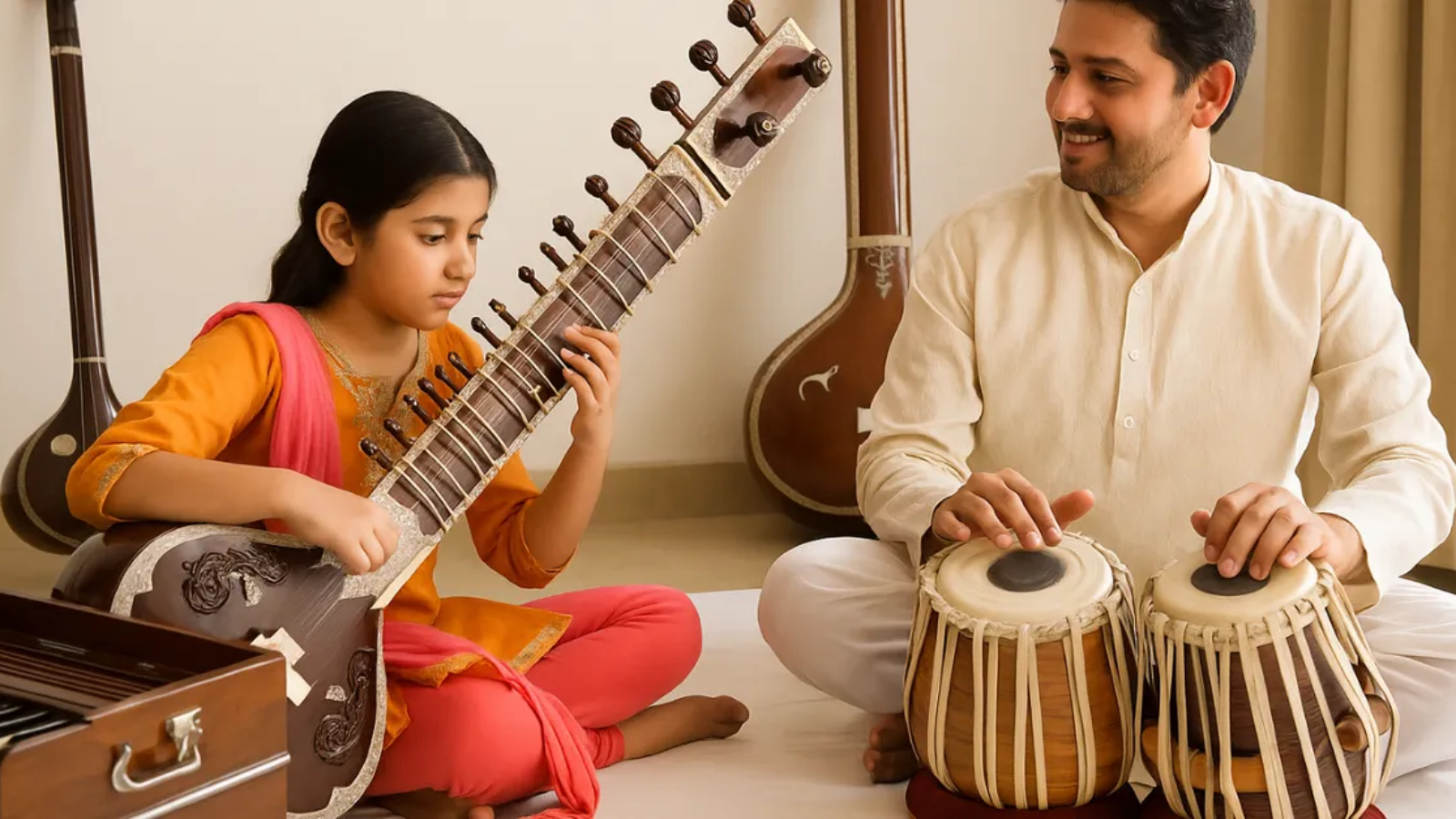Discover the essential role of music teachers in India’s musical journey

The journey of a young musician begins with curiosity—a fascination with melodies and rhythms that slowly grows into a deep passion. While talent is an important part of this journey, guidance plays an even bigger role. The guiding force? A music teacher. In the Indian musical landscape, music teachers are not just educators—they are gurus, mentors, and lifelong inspirations. This blog explores the incredible impact of music teachers on young lives, especially in the context of Indian classical and traditional instruments like the tabla, sitar, and harmonium. From instilling discipline to nurturing creativity, the role of music teachers is profound and often life-changing.
1. The Foundational Role of a Music Teacher
The very first interaction a child has with structured musical learning is usually through a teacher. Music teachers lay the groundwork by introducing students to:
- The basics of rhythm and melody
- Techniques for playing Indian instruments like tabla, veena, or sitar
- Importance of posture, breathing, and hand coordination
- Musical notations and theory
In Indian classical traditions, especially, this foundation is sacred. The guru-shishya parampara (teacher-student lineage) reflects the reverence placed on this relationship.
2. Personalized Learning for Every Student
No two students are alike, and effective music teachers recognize this. They craft lesson plans that suit the student’s personality, aptitude, and musical interests. For instance:
- A child with an ear for rhythm may be directed towards percussion instruments like tabla or mridangam
- Someone who enjoys melody may be encouraged to pursue sitar or bansuri
Such customized guidance fosters enthusiasm and faster learning. Teachers also identify strengths and work on weaknesses, making students more confident performers.
3. Mentorship Beyond Music
One of the defining traits of impactful music teachers is that their influence extends beyond music. They help students:
- Build discipline through regular practice routines
- Develop patience—vital when learning complex ragas or talas
- Boost their self-esteem through encouragement and performance opportunities
- Learn time management by balancing academics with musical practice
In India, music teachers often become secondary parental figures, nurturing their students’ emotional and creative well-being.
4. Introducing Indian Instruments and Their Cultural Significance
A crucial part of shaping a young musician’s life is exposure to Indian musical heritage. Music teachers are often the first to:
- Explain the history and cultural roots of instruments like the tabla, dholak, sitar, sarod, veena, and tanpura
- Demonstrate the sound variations and techniques unique to each instrument
- Encourage appreciation of classical composers and regional musical styles
For example, when teaching harmonium, teachers also introduce bhajans, ghazals, and devotional songs, giving context and meaning to the lessons.
5. Building Stage Confidence and Performance Skills
Performing in front of others is a transformative experience for young learners. Music teachers play a vital role in:
- Preparing students for recitals, school performances, and competitions
- Teaching stage presence, posture, and handling nervousness
- Training in group coordination during ensembles or jamming sessions
These experiences not only hone musical ability but also develop public speaking, confidence, and resilience.
6. Encouraging Creativity and Improvisation
Indian music places great importance on improvisation. Whether it’s a tabla solo or a sitar rendition of a raga, the ability to improvise is essential. Music teachers:
- Teach the basics of improvisation within the raga framework
- Encourage students to explore different rhythmic cycles or “taals”
- Inspire original compositions or unique interpretations of classical pieces
This nurtures creativity, one of the most important skills for a lifelong musician.
7. Helping Students Set and Achieve Goals
Goal-setting is another way music teachers shape students’ lives. This could include:
- Completing grade levels in Indian music board exams
- Mastering a specific raga or tala
- Learning to accompany bhajans or light music
- Preparing for a performance on Independence Day or school events
By tracking progress, providing feedback, and celebrating milestones, teachers instill a growth mindset.
8. Connecting Students to Musical Communities
Great music teachers open doors to broader musical communities by:
- Introducing students to music schools, online classes, or workshops
- Connecting them with other musicians for duets or group learning
- Encouraging participation in cultural programs, temple festivals, and inter-school music contests
Such exposure is essential to build motivation, friendship, and a sense of belonging.
9. Teaching Discipline Through Practice
Indian classical music demands rigor. A sitar player may need to spend hours perfecting a single note. A tabla student might spend days mastering a new taal. Music teachers:
- Instill practice discipline from the very first lesson
- Set structured routines that balance theory, technique, and performance
- Use repetition and feedback to build precision and musical expression
This discipline also positively affects academics and other areas of life.
10. Encouraging Lifelong Learning
The beauty of Indian music is that learning never ends. Music teachers plant the seeds of lifelong curiosity. They encourage students to:
- Explore other instruments like bansuri, dhol, or harmonium
- Attend concerts of maestros to learn by observing
- Continue music even during college or careers
A good teacher ensures that music becomes a lasting companion in a student’s life.
11. Emotional Support and Understanding
Music is deeply emotional, and children often bring their feelings to the learning space. Teachers:
- Create a safe, non-judgmental environment for expression
- Use music as a way to release stress or manage emotions
- Provide encouragement after failures or poor performances
This emotional bond helps students view music as therapy and self-expression, not just performance.
12. Emphasizing Respect and Tradition
Indian music is built on respect—for the instrument, for the art, and for the teacher. Music teachers:
- Teach students how to tune and care for instruments like tabla or veena
- Reinforce respect for classical traditions, dress code, and stage etiquette
- Encourage listening to recordings of legends like Pt. Ravi Shankar or Zakir Hussain
This develops humility and gratitude, important traits for any artist.
13. Adapting to Modern Methods of Learning
While traditions are important, today’s teachers also use:
- Online classes with video feedback
- Digital metronomes and tanpura apps
- Online sheet music and YouTube tutorials
Modern music teachers combine old-school discipline with contemporary tools to enhance learning and make it fun.
14. Providing Career Guidance in Music
For students interested in music careers, teachers are often the first mentors who:
- Suggest pathways like music production, music therapy, teaching, or stage performance
- Guide students towards conservatories or universities specializing in Indian music
- Help build portfolios through recordings and live shows
A teacher’s recommendation also carries weight when applying to music institutions.
15. Helping Students Handle Criticism and Rejections
Music involves feedback, some of it harsh. Teachers help students:
- Understand the difference between constructive criticism and personal bias
- View rejection as a step toward improvement
- Stay focused on growth and internal satisfaction rather than external applause
This helps build emotional strength and resilience—qualities every artist needs.
Conclusion
The incredible impact of music teachers on young lives is often beyond what can be measured. They are not just teaching ragas or rhythms—they are building character, instilling discipline, nurturing emotion, and preserving cultural heritage. Whether it’s a young child learning the tabla in Chennai or a teenager exploring the sitar in Delhi, behind every successful Indian musician is a teacher who believed, guided, and inspired. For parents, choosing the right music teacher could be one of the most important decisions in shaping a child’s creative future. And for students, a music teacher is often not just a guide—but a lifelong companion in their musical journey.
At NMS Musicals, we offer a comprehensive range of musical instruments, including percussion, string, wind, and keyboard instruments. Our services encompass sales, expert servicing, and the manufacture of leather instruments. Explore our diverse collection and find the perfect instrument to suit your musical needs.
Visit our website to browse our offerings: nmsmusicals.in
For a closer look at our products, check out our shop page: nmsmusicals.in/shop
Stay connected with us through our social media channels:
- Facebook: https://www.facebook.com/nmsmusicalinstruments/
- Instagram: https://www.instagram.com/nmsmusicals/?hl=en
- YouTube: youtube.com/@nmsmusicals
Our shop locations are:
- Puducherry: 149, Perumal Koil Street, Heritage Town, Puducherry, 605001.
Map Link: https://maps.app.goo.gl/ejDwBBFEJmd3szxk7 - Chennai: No: 1, 1st Floor, Kandigai Street, TVS Nagar, Korattur, Chennai – 600076.
Map Link: https://maps.app.goo.gl/7oXmB6X7KQsqeuuw9
For inquiries, contact/Whatsapp us at 9500663895 or email us at laxman.m89@gmail.com.
Discover the world of musical instruments with NMS Musicals today!
For a visual overview of our percussion instruments, watch the following video:


 Cart is empty
Cart is empty 
Leave A Comment
You must be logged in to post a comment